How to Buy a Car in South Africa As a Foreigner: A Step-By-Step Guide
Thinking of buying a car as a foreigner in South Africa? Whether you’re planning a big Africa overland trip, or just a smaller jaunt through South Africa and a few of its neighbours, buying a car in South Africa is a great way to experience this magical continent on your own terms.
Buying a car in South Africa as a foreigner is not without its challenges though, as this country excels in meaningless bureaucracy and confusing rules that are only applied half of the time.
Feeling overwhelmed? When we started, we were too!
But don’t worry, we’ve got you covered. From everything from how to buy a car in South Africa as a foreigner to how to kit it out, we’ve covered all the bases.
Read on for our essential guide on buying a car in South Africa as a foreigner.
South Africa Travel Resources
- Read: Is South Africa Safe to Visit in 2024?
- Getting there: search for flights to South Africa
- Guidebook: pick up a Lonely Planet South Africa guidebook
- Where to stay: search for hostels and hotels
- Getting around: search for buses
- Rent a car: search for deals on car rentals
- Travel insurance: get travel insurance for your trip
- Money: get a Wise travel card to save big-time
- Tours: check out the best South Africa tours
Buying a car in South Africa
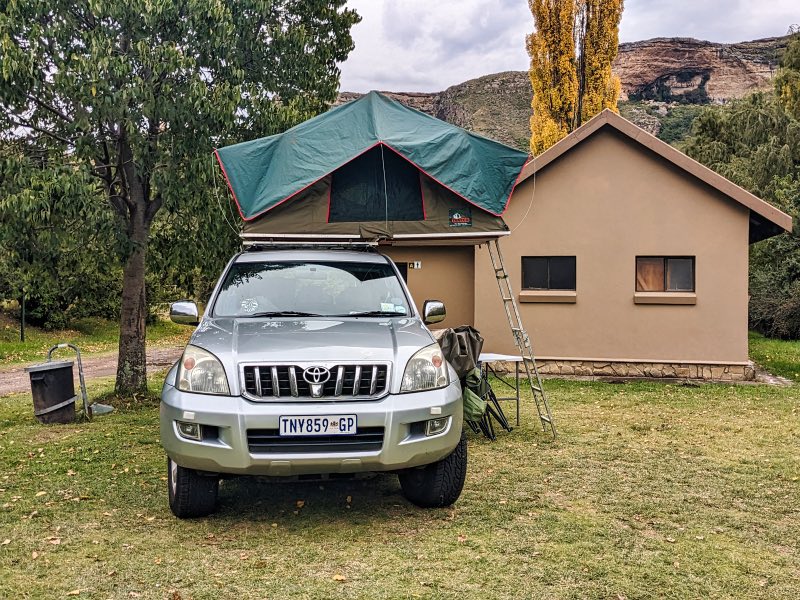
Buying a car in South Africa is the easy part. Of all the countries in Southern and Eastern Africa, South Africa has the best selection and most competitive prices.
Of the two big centres, Johannesburg and Cape Town are pretty comparable in terms of quality, stock and prices. Base yourself where you’ll be more comfortable and want to hang out for a few weeks whilst you go through the motions.
Related: Is Johannesburg Safe to Visit?
If you absolutely need to get a TRN (see below), then Cape Town is your best bet. While you’re there, be sure to check out Cape Town’s coolest neighbourhoods!
Looking for things to do in Johannesburg? Read 15 Awesome Things to Do in Johannesburg
Where to Look for a Used Car in South Africa
There are multiple places you can look for a used car in South Africa when buying a car in South Africa as a foreigner.
Facebook Marketplace is still one of the most popular spots, with a good selection of cars in various locations. Gumtree, South Africa’s online marketplace, is also worth a check.
Specific online retailers include autotrader.co.za, cars.co.za and webuycars.co.za.
Facebook has a specific Overlanding Buy and Sell Group that has a frequent flow of cars. The benefit of this group is that many cars are overland-ready, with all the bells and whistles. Just buy the car, complete the registration process and you’re good to go. The drawback of buying a kitted-out car is that prices are generally somewhat inflated and more expensive. Essentially, you’re paying for convenience.
Bushlore, a 4×4 rental company, sells fully equipped 4x4s with a 1-year buyback guarantee, but these are a very pricy option.
If you’re in Cape Town, African Overlanders also sells fully equipped 4x4s with a 1-year buyback guarantee, and these are much a cheaper (but not as flashy) option as Bushlore.
Important: when buying a secondhand car in South Africa as a foreigner, do your due diligence and always get an external inspection done. DEKRA is the big name, but their reviews are pretty shit. That said, we went through a Toyota dealership and they were shit too (not with the actual inspection, just the admin side of things).
Want to do some hiking in South Africa? Check out the Wolfberg Arch and Wolfberg Cracks in the Cederberg Mountains
Buying a Car in South Africa as a Foreigner: Roadworthy Certificates
When you’re buying a car in South Africa as a foreigner, it’s important to understand how roadworthy certificates work.
In South Africa, secondhand cars do not need to be sold with a valid roadworthy certificate. They do, however, need a valid roadworthy certificate to be registered in a new owner’s name.
What this means is that to complete the transfer of ownership/registration process, the car will need to undergo a roadworthy inspection and receive a pass. Once issued, a roadworthy certificate is valid for 60 days.
When looking at a car, be sure to ask clearly whether the car has a valid roadworthy certificate and whether this is included in the sale.
If it does not, then you as the buyer will be responsible for getting it inspected and fixing any problems that may arise. This can add up to a lot more money than the initial sale price. It’s important to note that when buying a car in South Africa as a foreigner, you can always negotiate with the buyer to have a roadworthy included with the purchase.
Read next: Johannesburg’s Top 5 Coolest Neighbourhoods
Do I need a 4×4 to travel across Africa?
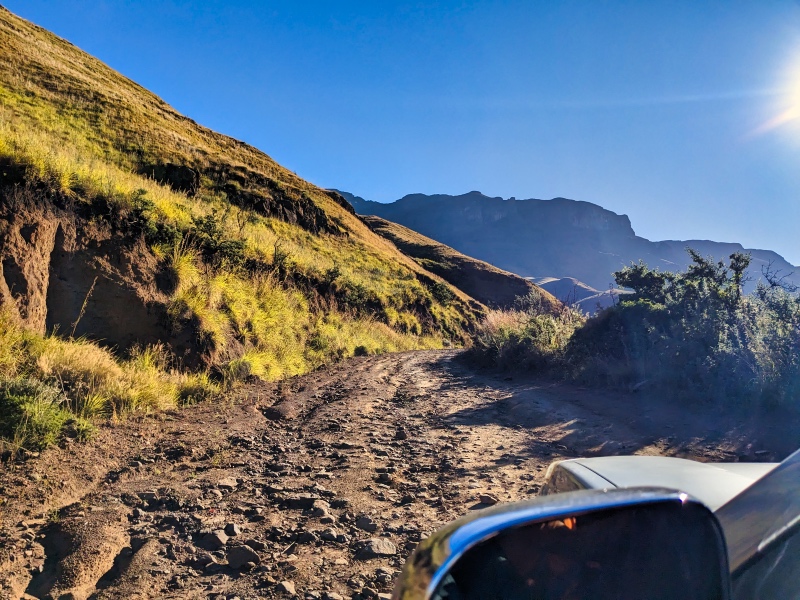
As always, this depends on the type of trip you’re planning and where you want to go.
If you plan to drive on main (albeit bad) roads and only visit the main tourist attractions, then it is possible to get by on an all-wheel-drive vehicle such as a Rav 4.
If, like us, you want to get off the beaten track, be a bit more adventurous and open up more possibilities, then we highly recommend getting a 4×4. Places like northwestern Namibia and Sani Pass in Lesotho are only accessible by 4×4. We chose a 4×4 because we want the freedom to explore anywhere we want and not be limited by our car. It would be a complete bummer to have to turn down an awesome trip because our car wasn’t up to the job.
Heading to Namibia? Be sure to check out Fish River Canyon
Buying a Car in South Africa as a Foreigner: How to Pay for a Car in South Africa
Once you’ve selected your dream car to buy in South Africa as a foreigner, you need to pay for it.
Most cars will cost at least $10,000 USD, which means a big chunk of money passing hands, probably internationally.
What’s the best way to pay for buying a car in South Africa as a foreigner? Hands down, a Wise account.
We used our Wise account to pay for the car. With Wise, it’s easy to transfer money from a bank account in one country to one in another (i.e., from our Australian account to the seller’s South African one). It’s literally just a few steps on the app and it took less than 48 hours for the money to move between accounts.
Fees with Wise are significantly lower than with any bank and you get the best exchange rate. Plus, we didn’t have to worry about lugging around a lot of cash. It’s a no-brainer!
Registering a car as a foreigner in South Africa
Registering a car as a foreigner in South Africa – this is where things get complicated.
To register a car in South Africa, you must be on the national register. South African citizens are, foreigners aren’t. So for a foreigner to buy a car in South Africa and register it in their own name, there’s an extra step involved.
This means to buy a car in South Africa as a foreigner, you have two options:
- Go through some hoops and then register a car in your own name; or
- Register a car in a South African citizen’s name.
How To register a car in South Africa in your own name (as a Foreigner)
For a foreigner to register a car in South Africa in their own name and get the title to the car, you need to get a Traffic Registration Number (TRN).
Theoretically, this can be done at any Motor Vehicle Department in the country.
In reality, it can only be done in Cape Town. We visited 2 different departments in Johannesburg, and both confirmed to us that Gauteng (the province Johannesburg is in) will not issue a TRN to someone on a visitor’s visa.
Why? Who knows. Whilst the rules and regulations clearly state this is not the case, if the person you’re speaking to won’t do it, it doesn’t matter.
The positive side is that we’ve heard of numerous positive results from foreigners in Cape Town. The Civic Centre office appears to be particularly helpful.
So, the moral of the story is: if you want to register a car in your own name as a foreigner in South Africa – head straight to Cape Town.
Read: 12 Epic Cape Town Hiking Trails + Essential Tips
How to apply for a TRN in South Africa as a Foreigner
Again, on paper, the process for applying for a TRN in South Africa is relatively straightforward.
A TRN must be applied for at the Motor Vehicle Department and can take anywhere from one day to six weeks to process. Always budget the full 6 weeks. It very well could come sooner, but always err on the side of caution.
If you know that you want to buy a car in South Africa as a foreigner, because visitors are only given 90 days on arrival, we suggest starting the TRN process as soon as you arrive in South Africa.
When you apply for a TRN you need to bring in:
- A certified copy of your passport;
- A certified copy of your visa stamp;
- Proof of address in South Africa;
- A copy of a utility bill for said address in South Africa; and
- 2 black and white passport-style photos.
At the Motor Vehicle Department, fill in the form, submit your documents and wait. The TRN ‘should’ be free.
You can have all of your documents certified for free at any South African Police Station. For those of you in Joburg, we’ve used the Parkwood Police Station multiple times and it’s always been superfast and easy.
For your proof of address in South Africa, a letter from your hostel, hotel or guesthouse will suffice. You also need to include a utility bill confirming the address.
Your proof of address must align with the Motor Vehicle Department you go to. So, if you have proof of address from Cape Town, you must go to a Department in Cape Town, not George or Pretoria.
We recommend following up on your application every 4-5 working days. We have heard reports of the application getting ‘stuck’ in the system.
Once you have the TRN, you proceed as normal.
Note that there are fixers across South Africa who will obtain a TRN for you in advance, for a fee (usually around 2000 – 3000 ZAR).
How To register a car in a South African’s name
Another option, if this is available to you, is to register the car in a South African citizen’s name. Due to the hassles of obtaining the TRN, this is a very popular option for foreigners who buy cars in South Africa. Plus, it’s super easy!
Essentially, under this option, you buy the car, but the registration is in someone else’s name. You’ll complete all the registration steps below (you can do it as a proxy).
To drive the car across borders, draft a Power of Attorney letter. This letter states that you will have full power over the vehicle and can drive it to all countries included in the letter.
On the Power of Attorney letter, be sure to include:
- Vehicle engine number;
- Registration number;
- Make and model of the car; and
- All countries you could possibly envision driving the car into.
The letter must be signed and notarised – again, this can be done at any South African Police Station. With this letter, plus a certified copy of the ‘owner’s’ passport, you are legally allowed to drive the car across borders.
As a note of confidence, in 10 months overlanding Africa, we’ve had zero issues with our letter.
If you are planning on selling the car later, it’s also a good idea to have a pre-signed Letter of Sale filled out for future use.
Read: 10 Epic Namibia Camping Sites + Essential Tips
Buying a Car in South Africa as a Foreigner: The Registration Process

Once you’ve gone through all the above hoops, the actual registration process for buying a car in South Africa is very easy.
If you’re purchasing a car from a dealership, they will generally attend to the registration and you won’t have to do anything.
If you’re purchasing a car privately, you must submit the registration documents yourself to a Motor Vehicle Registering Authority (‘MVRA’).
There are two forms that must be filled out: a Notice of Change of Ownership and an Application for Registration and Licensing of Motor Vehicle Form. These can be downloaded online in advance to save you a trip.
There are sections on both forms that require details and signatures from both the buyer and the seller. Don’t worry about being too pedantic about filling them out – ours were blank in some sections that we didn’t understand and they still accepted them.
The two above forms must be submitted at an MVRA, along with:
- The vehicle registration certificate;
- A certificate of roadworthiness; and
- A copy of the identity document of whoever’s name the car will be registered in (so your passport or the identity card of the South African resident).
The South African Department of Transport website states that you also need to submit proof of purchase, a driver’s license and proof of address. These are unnecessary. We brought them with us, and the employees didn’t even want to look at them. It’s also worth noting that the copy of the identity document does not need to be certified.
When you arrive at the MVRA, there should be someone who will first look at your documents to make sure everything is in order. If so, they will sign off on it and then you can proceed to the queue.
When it’s your time to be assisted, simply hand over the documents and the employee will do the rest. You’ll have to pay around 205 ZAR to re-register the car and likely another 400 ZAR for a License Disk for the car. That should take around 15 – 20 minutes and you will walk out with the new registration in hand. Congrats!
Authorising a Proxy to Register the Car
You can also appoint a proxy to register the car on your behalf. If you are registering it in someone else’s name and you’re going to the MVRA to complete the paperwork, then YOU are the proxy!
You don’t need any extra documents to register the car in someone else’s name. Again, we read that we needed a letter and a certified copy of our ID, but in reality, these weren’t required.
We registered the car in our friend’s name, and all they wanted was a copy of his ID, the vehicle registration certificate, the roadworthy and the two forms. In fact, the guy who was working behind the counter took so little notice of the copy of the ID that he actually thought we were registering the car in Zandy’s name.
There are multiple companies who will attend to the entire registration process for you. A recommended one in Johannesburg is Cathy’s. The additional fee is around 200 ZAR and the turnaround is 4-5 business days. If you have this time to work with, then this is a good-value option.
However, going in yourself is quite the cultural experience, so if you have a couple of hours to kill, then go for it.
Insurance
When insuring the car you bought in South Africa as a foreigner, there are two types of insurance you will need to consider: comprehensive insurance and third-party insurance.
Comprehensive Insurance
The first is comprehensive insurance that you arrange in South Africa. This covers you if something happens to your vehicle or another vehicle that you crash into. When arranging this, you will need to find a provider that covers outside South Africa (only of course if you plan on driving outside South Africa).
The major insurance providers that cover outside South Africa are:
- Santam;
- TuffStuff;
- Cross Country; and
- Outsurance Out-in-Africa.
As a note, Outsurance is quite limited as they only allow the car to be outside South Africa for 3 months at a time and for a maximum of 6 months in a calendar year.
We used TuffStuff and have been generally happy with them. We had to replace our windscreen in Rwanda and it was a very straightforward procedure. The only drawback is that they only cover up to the equator, so if you’re going further north, they won’t cover you. (It was an anxious 10 weeks in Uganda for us, to say the least).
When arranging insurance, you will need to specify all the possible driver’s names up front. Some companies also want to know which countries you will be driving to.
Most companies will require the installation of a tracking device on the car, in case of theft. The insurance company will organise this and it usually adds another 70 ZAR to 110 ZAR to the monthly cost of the insurance.
We found that arranging our insurance was more time-consuming than the actual registration process. To be on the safe side, budget 3-5 days.
Third-Party Insurance
The second type of insurance to consider is third-party insurance in the countries you will be visiting. This covers if someone is injured in an accident in that country.
This type of insurance isn’t required in South Africa, Lesotho, Namibia or Botswana, as it’s already included in an extra levy on fuel. It is required in most other countries in South and East Africa.
You can purchase third-party insurance at the border of each country, or in advance (in one of the countries) via Comesa. The first countries at which you can buy it leaving South Africa are Zambia, e-Swatini or Zimbabwe.
We purchased a Comesa policy via Phoenix Insurance in Zambia. It was very easy and straightforward and covered all the countries that Comesa covers. It was much more cost-effective to purchase a Comesa policy for multiple countries than individual third-party in each country. You can also extend Comesa insurance on the road.
How to equip a car in South Africa for Overlanding Africa
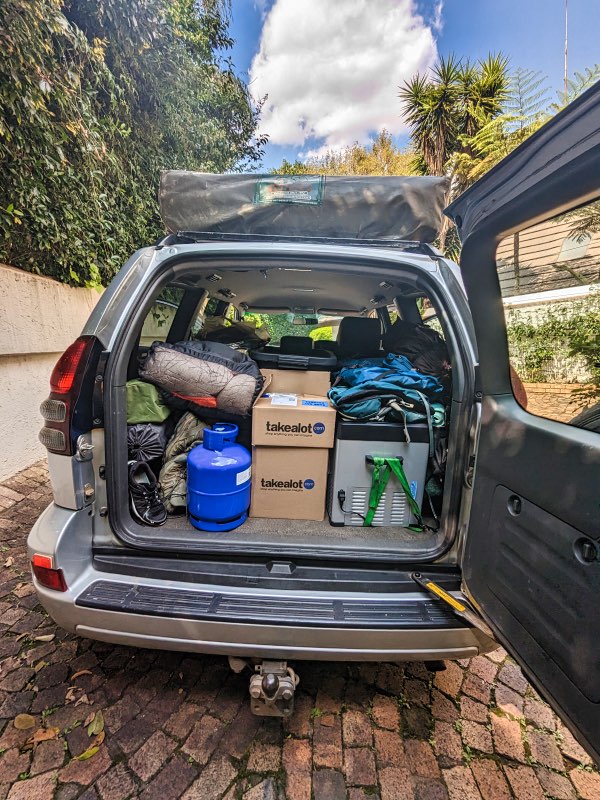
Once you’ve found the car, got it registered and insured, then the fun part begins – kitting it out!
Finding Overlanding Gear Secondhand
All you bargain-hunters out there, I have some bad news for you: you’re probably going to have to buy most of your gear brand new when buying a car in South Africa as a foreigner.
Unfortunately, unlike many other places in the world, there’s not a huge second-hand market for camping or 4×4 gear in South Africa.
Sure, you can check places like Gumtree and Facebook Marketplace, but in our experience (and from others we have spoken to), there isn’t a huge supply and then for what is available, the prices are barely discounted. For example, when we looked, used rooftop tents would be discounted by maybe 1000 – 2000 ZAR from a new one (from 15000 ZAR to 13000 ZAR). For that difference, you’re better off getting a new one, with a warranty.
That said, after much persistence, we did manage to score a good deal on a secondhand rooftop tent, so it’s worth taking a look. We’d say, plan for getting one or two big items secondhand (at most), but the rest will probably be new.
Thrift stores are also not a great option. We checked out a couple. Honestly, the stuff was in pretty crappy condition and relatively high-priced.
Another option for secondhand gear is to call Bushlore. They sometimes sell their tents and other gear for heavily discounted prices. They didn’t have anything going when we were looking but did mention that they offload a lot in the low season (May – September).
Where to Source Overland Gear Brand-New
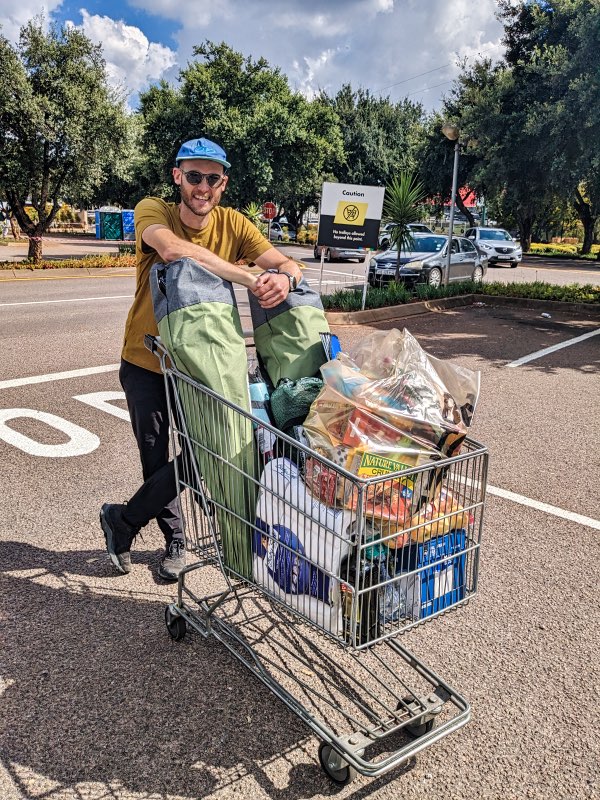
For your general camping/outdoor gear, the best two stores you can check out are Outdoor Warehouse and Camp and Climb. Both have shops in both Joburg and Cape Town, they carry lots of good stock and the prices are pretty decent.
For other stuff like storage and cooking supplies, West Pack, Crazy Plastics and Makro are your best bet. We found Crazy Plastics to have better prices than West Pack and their quality to be better.
Makro is like a combination of Walmart and Costco – just know that you need a membership card to pay for your purchases. You can get this at the customer service desk for free. We found out the hard way – after waiting in line for 45 minutes!
Another good option is Takealot. They’re an online store that sells pretty much anything. Quality varies, but we sourced a lot from them. As a bonus, they have depots everywhere where you can have the stuff delivered, so you don’t need an address.
For all things 4×4, we’ve been really happy with 4×4 MegaWorld and 4WD Overland.
Important: When you leave South Africa you can claim the VAT back on anything you purchased that is not permanently attached to your car (so a fridge, rooftop tent, chairs, and most of your other gear). Be sure to keep your receipts and make a claim when crossing the border. Be warned: it may take a year to get.
Other Resources for Buying a Car in South Africa as a Foreigner
If you want further information on buying a car in South Africa as a foreigner, and general overlanding information, we highly recommend getting a copy of Bradt’s Africa Overland.
Like all guidebooks, don’t use it as gospel, but we found it really useful for both preparation and travel. What’s really great is that for each country covered (which is every country in Africa), they focus on where you can find good camping.
Also indispensable for buying a car in South Africa as a foreigner is the Overlanding Africa group on Facebook. There’s a lot of collective knowledge there!
Disclaimer: This post contains affiliate links. This means that if you buy or book anything through them, we’ll earn a small commission at no extra cost to you. This helps us run this website and create comprehensive guides to help you get off the beaten track. We only recommend products and/or services that we use ourselves and trust.

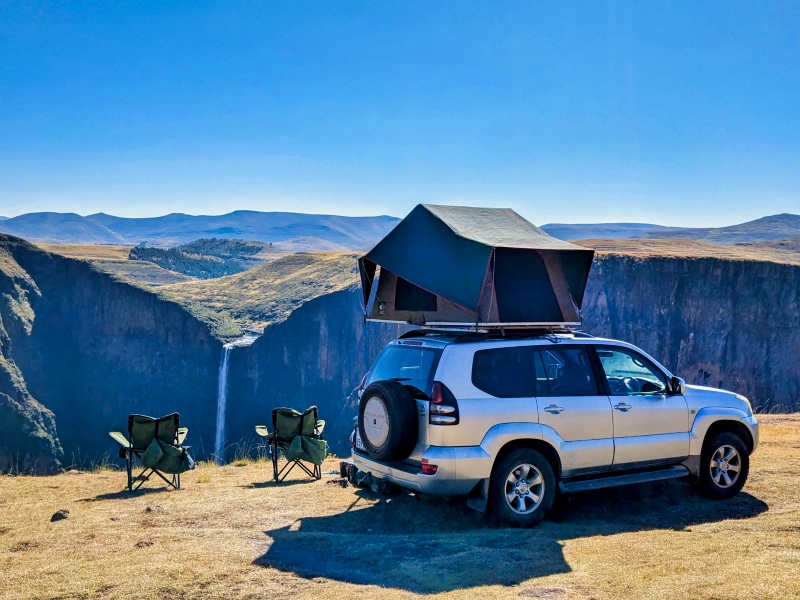
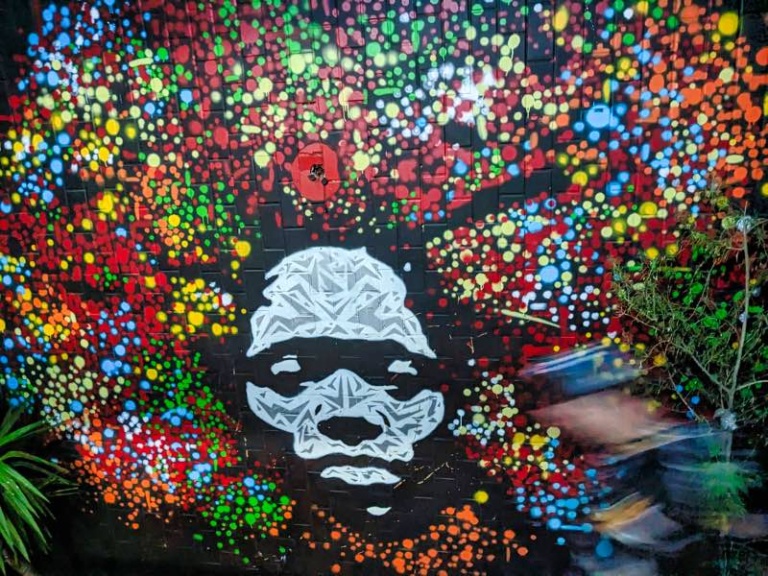
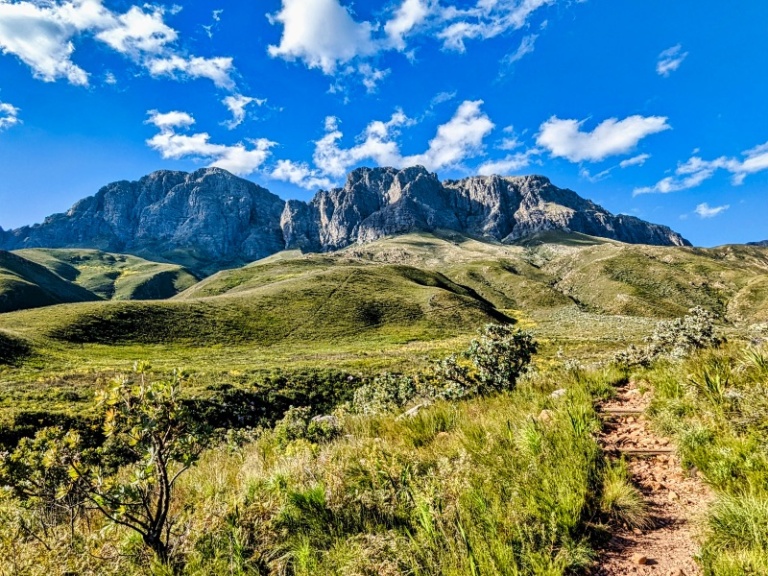
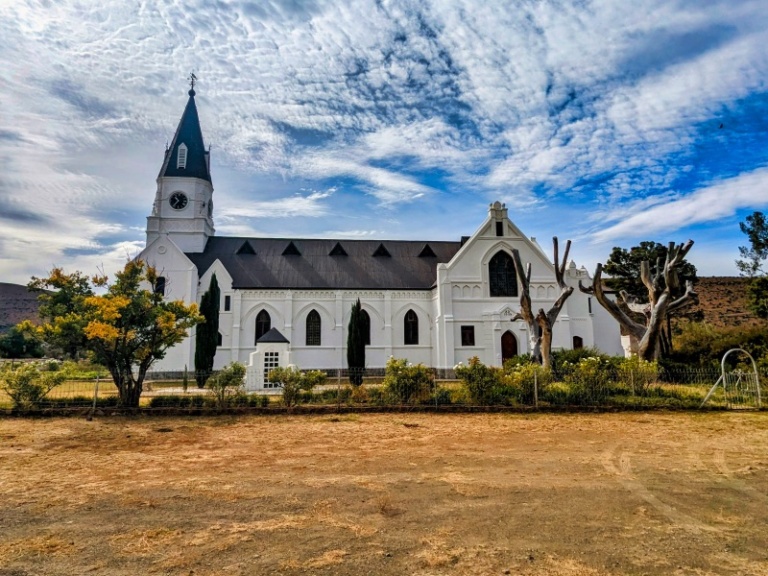
![Is Johannesburg Safe to Visit [2024]](https://exploretraveloasis.com/wp-content/uploads/2023/04/is-johannesburg-safe--768x576.jpeg)
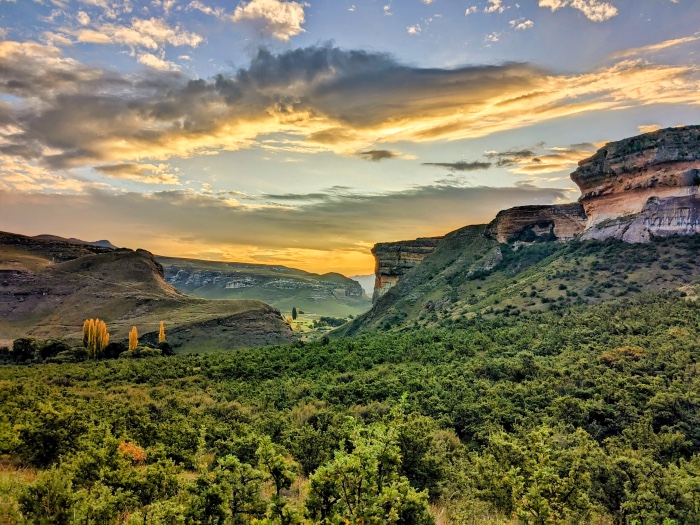
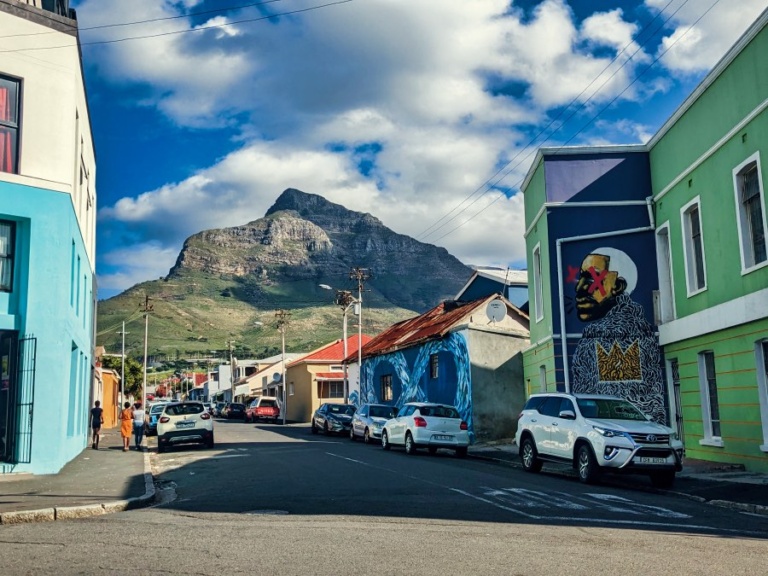
Hi, wij hebben gelezen dat het juist erg moeilijk was om in Zuid-Afrika een auto te kopen, tot wel onmogelijk. Maar op jullie website lijkt het allemaal erg gemakkelijk te doen. Ik zie last updated 2023 staan, maar wilde even checken of de informatie nog steeds actueel is. Dankjewel! Groeten Celine
Hi Celine! We just bought our car in March of this year (2023), so all the information is up to date. Cheers!
Hey the two of you, thank you for this awesome and nicely prepared chunk of information! This is so helpful to us! We want to buy a car in South Africa next year for a big overland trip and we‘ve been fighting ourselves through the comment jungle in different overlander forums… so hard to get reliable and updated information on this topic (at least in German language). Thank you so much and fun travels!
Amazing! So glad it was helpful and stay tuned for more updates on this topic. Enjoy your journey – it’s going to be amazing.
Pretty straightforward process. Thanks for publishing about this. The only question that I haven’t answered yet is where to get the utility bill? Would a hotel get me one under my name?
Hi Sebastian – thanks for reaching out! In lieu of a utility bill, you can get a letter from your accommodation saying that you ‘reside’ there and then supply one of their utility bills (or something else official). Hope that helps!